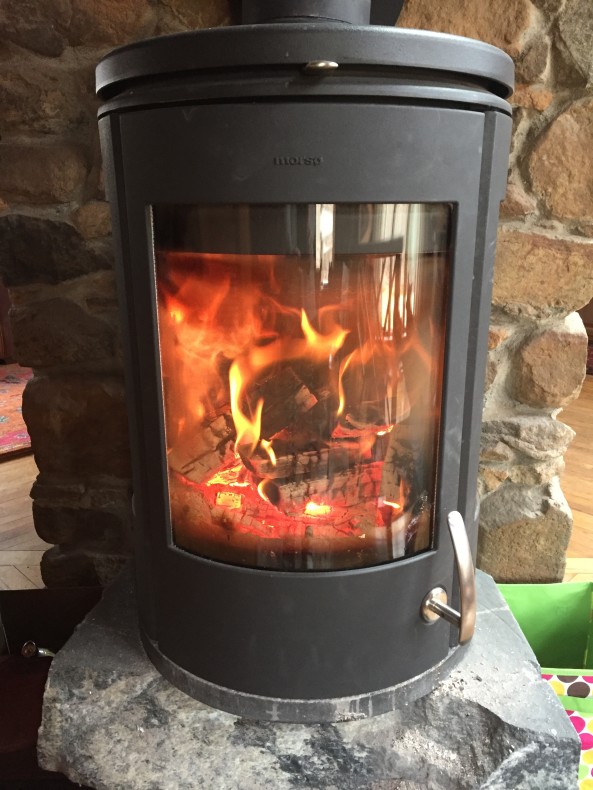 March showed up last week, on little cat feet rather than lion paws. A gentle snow jacketed the crocuses before watering their roots. The least patient daffodils opened, heads dipped against any last-ditch icy gusts. Spring’s legs are wobbly, but she’ll find her stride soon enough.
March showed up last week, on little cat feet rather than lion paws. A gentle snow jacketed the crocuses before watering their roots. The least patient daffodils opened, heads dipped against any last-ditch icy gusts. Spring’s legs are wobbly, but she’ll find her stride soon enough.
Still, at my little cabin in the Virginia woods, the nights remain cold. So we keep working our way through the woodpile, building the season’s last fires. We stack a trio of big, dry logs in the fireplace before bed, so the heat rises and swirls around us as we sleep. In the wee hours the fire slows to a simmer, and when we get up we stir the hot embers and feed them fresh wood, and ourselves fresh coffee, enjoying warmth through to our aging bones for one more day.
This my favorite turning point of seasons, the transition from hunching by the stove to cracking winter’s glue where windows meet their wells. Opening to those first warmish breezes and hearing the crosstalk of so many birds is a happy, cleansing ritual for me. And nothing feels better than the morning sun on a winter-weary face.
But spring’s stirring means my parting with other favorite ritual: watching fire burn. Evolutionary biologists take us back to ancestral fire makers to explain the appeal. Fire tests our ability to control nature, they say. And when we can’t tame something, we are bewitched by it. Studies suggest it isn’t as universal a lure as it may seem, though, that only in cultures in which it remains dangerous and unmastered in childhood does it rise from mundane to captivating in adulthood. If it is a constant and entirely utilitarian in a child’s life, it loses something.
The rest of us became those pre-teens crouched behind the school lighting match after match, testing our palms against the flame. And now we stare into the bonfire or fireplace, poking the wood with a stick, in want of nothing more for a time. It seems that even people who are otherwise easily distracted can be engrossed for long stretches in a sort of meditative state. Watching fire fascinates and calms us. It never feels like a waste of time even though we stop everything else just to stare.
I think nature’s forces necessarily grab and hold us—big storms, tornados, hurricanes, tsunamis, anything that can wipe us out inspires awe and gives our collective ego a much-needed slap in the face. At a certain point all we can do is sit back and watch what raw power really looks like, and what it can do. There’s a sort of relief in letting it play out as it will.
As I type this, flames lick the curved glass of our black wood stove, and between paragraphs I watch them dance. That is, truly, what fire does—I’m hard pressed to find a better word. It is an organic and unpredictable thing, potential energy becoming motion, no steps repeated. Its energy always seems to sap mine: My heart rate slows and my mind goes quiet. Warmth moves through me. Crackle, hiss, pop. I move closer.
For me, part of enjoying nature is accepting my comparative weakness. I can contain this fire in a metal and glass box, but I am powerless to structure its movements, or even to effectively describe them. Fire is one of nature’s transformative arts, with many of the characteristics that draw us to a great painting. “I see something new every time I look at it.” “It seems to generate light from within.” “The colors are so rich.” “It’s full of movement.” “It draws me in.” “I can look at it for hours without getting bored.” We venerate the artist for doing something we know we could never achieve. When nature is that artist, while of course I don’t want her to harm us with her art, I appreciate that her most incredible work happens when she has complete freedom to create…and destroy.
If I have some deep desire to tame fire, I’m unaware of it. For me, that it has a “mind” of its own is what’s so alluring; the only certainty is, if fed, fire will consume. Beyond keeping it confined and fanning its flames, I am not in charge of what comes next. No matter. I’d much rather let go and reflect on the crumbling logs, on the ravenous tongues.
Photo by the author
Loved it.
“aging bones” hey not bad for 35…
-gh